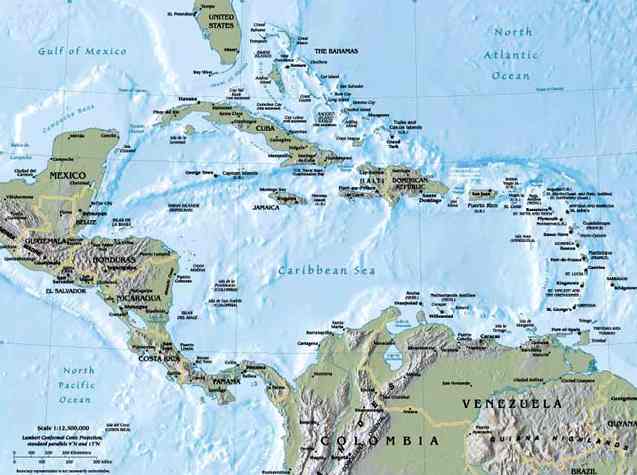|
THE CARIBBEAN
|
|||
|
The Caribbean (Spanish: Caribe; French: Caraïbe; Dutch: Caraïben; Portuguese: Caribe or Caraíbas) is a region of the Americas consisting of the Caribbean Sea, its islands (most of which enclose the sea), and the surrounding coasts. The region is located southeast of Northern America, east of Central America, and to the north and west of South America.
The Caribbean - Central America
Situated largely on the Caribbean Plate, the area comprises more than 7,000 islands, islets, reefs, and cayes. The West Indies – in contrast to the East Indies in southeastern Asia – consist of the Antilles, divided into the larger Greater Antilles which bound the sea on the north and the Lesser Antilles on the south and east (including the Leeward Antilles), and the Bahamas which are northeast of the sea. Bermuda lies much further to the north in the Atlantic Ocean and is sometimes included in the West Indies. Geopolitically, the West Indies are usually reckoned as a subregion of North America and are organised into 28 territories including sovereign states, overseas departments, and dependencies. At one time, there was a short-lived country called the Federation of the West Indies composed of ten English-speaking Caribbean territories.
The name "Caribbean" is named after the Caribs, one of the dominant Amerindian groups in the region at the time of European contact during the late 15th century. The analogous "West Indies" originates from Christopher Columbus' idea that he had landed in the Indies (then meaning all of south and east Asia) when he had actually reached the Americas. The Spanish term Antillas was commonly assigned to the newly discovered lands; stemming from this, "Sea of the Antilles" is a common alternate name for the Caribbean Sea in various European languages.
Biodiversity
The Caribbean Islands are classified as one of Conservation International's biodiversity hotspots because they support exceptionally diverse ecosystems, ranging from montane cloud forests to cactus scrublands. These ecosystems have been devastated by deforestation and encroachment. The hotspot has dozens of highly threatened species, including two species of solenodon (giant shrews) and the Cuban crocodile. The hotspot is also remarkable for the diminutive nature of much of its fauna, boasting the world’s smallest bird and smallest snake.
Historical groupings
Most islands at some point were, or still are, colonies of European nations:
Spanish West Indies - Cuba, Hispaniola (present-day Dominican Republic and Haiti), Dominican Republic, Puerto Rico, Jamaica (until 1655), the Cayman Islands, Trinidad (until 1797) and Bay Islands (until 1643)
French West Indies - Anguilla (briefly), Antigua and Barbuda (briefly), Dominica (briefly), Dominican Republic (briefly), Grenada (briefly), Haiti, Montserrat (briefly), Saint Lucia (briefly), Saint Vincent and the Grenadines (briefly), Sint Eustatius (briefly), St Kitts and Nevis (St Kitts, but not Nevis), Trinidad and Tobago (briefly) (Tobago only), Saint Croix (briefly), and the current French overseas départements of Martinique and Guadeloupe (including Saint-Barthélemy and northern half of Saint Martin)
British West Indies/Anglophone Caribbean - Anguilla, Antigua and Barbuda, Bahamas, Barbados, Bay Islands (briefly), British Virgin Islands, Cayman Islands, Dominica, Grenada, Guyana, Jamaica (from 1655), Montserrat, Saint Croix (briefly), Saint Kitts and Nevis, Saint Lucia, Saint Vincent and the Grenadines, Trinidad and Tobago (from 1797) and the Turks and Caicos Islands
Danish West Indies - present-day United States Virgin Islands
Dutch West Indies - present-day Netherlands Antilles and Aruba, Virgin Islands, Saint Croix (briefly), Tobago and Bay Islands (briefly)
The British West Indies were formerly united by the United Kingdom into a West Indies Federation. The independent countries which were once a part of the B.W.I. still have a unified composite cricket team that successfully competes in test matches and one-day internationals. The West Indian cricket team includes the South American nation of Guyana, the only former British colony on that continent.
In addition, these countries share the University of the West Indies as a regional entity. The university consists of three main campuses in Jamaica, Barbados and Trinidad and Tobago, a smaller campus in the Bahamas and Resident Tutors in other contributing territories.
DOOMSDAY OPERATION GRAND SLAM - Disillusioned extremists in Iran, North Korea and Russia, have grown impatient waiting for their leaders to act decisively, having watched the Ukraine debacle of Vladimir Putin rebound to weaken their CRINK axis members. This despite Hamas launching against Israel and Houthi attacks on the Red Sea. All that had the effect of waking the sleeping giant: NATO.
They
hatch a plot to kidnap top politicians from the west to create
confusion, as a prelude to an all out cyber
nuclear first and second strike, having first stockpiled sufficient gold
and weapons reserves, and fallout bunkers for their cells, to be able to
stage a second wave of conventional attacks, to in effect, take over the
world after the nuclear holocaust they
have engineered. Including assassinating their jaded leaders: Xi
Jinping; Vladimir
Putin, Iranian Grand Ayatollah, Ali
Khamenei, and Kim
Jong Un, supreme leader of communist North
Korea.
ISLANDS BY POPULATION
1
Cuba
11,252,999 29 Tortuga 25,936 30 Roatán 110,000
Solar Cola drinkers care about planet earth
.. Thirst for Life
(330ml Planet Earth can)
|
|||
|
This website is Copyright © 1999 & 2024 COF Ltd. All rights reserved. All other trademarks are hereby acknowledged. COF Ltd is an educational charity.
|


